July 2021

World Premiere Review!
JERN 11S Compact Loudspeaker Review
A well-balanced speaker that presents a lovely neutral rendition of music.
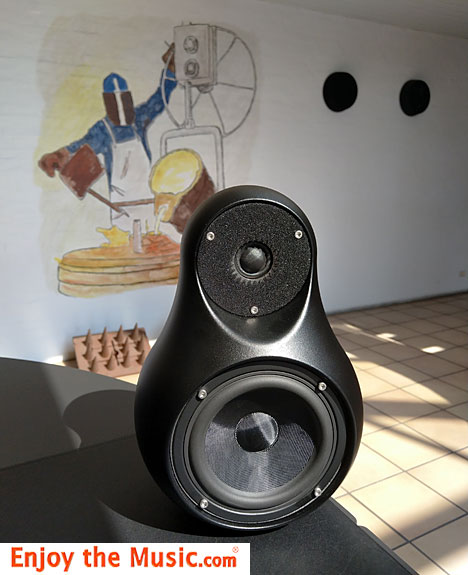
What is a poor reviewer to do when he would rather put on some more music than write on the review? My wife might say “Suck it up and get on with it”. This could imply that I do not want to say anything but that’s not the case. I am just enjoying the music too much.
There is a bit of a backstory here.
If I remember well, the first time I saw the JERN Speakers was a couple of years ago at the ISE Exhibition in Amsterdam. Ole Lund Christensen, whom I have known for 20 odd years, was banging away on a piece of steel, a piece of aluminum, and his very heavy cabinets made of a special kind of cast iron using a little hammer. There is a video floating around on YouTube where he does it with a piece of aluminum and a piece of his special “Vibrakill” cast iron.
It was very instructive since both the steel and the aluminum rang like bells and the JERN cabinet just gave a dull thud. As he explained that was exactly the point of the demo.
Inert cabinets, i.e. cabinets that don’t flex or ring are one of the things most serious loudspeaker designers really want. I might be oversimplifying things just a little bit here since some designs, the BBC school of thought specifically, deliberately use flexing of the speaker’s walls stating that if you cannot avoid flexing, you might as well use flexing to lower the frequency and quickly dampen the vibrations.
Most speaker designers today though are aiming for stiff and dead cabinets. Some have been pointing out that there are no absolute solutions, just a wide variety of compromises.

A (Very) Brief History Of JERN Loudspeakers
It starts with a foundry company specializing in complex castings of metals for special purposes. It is called “Dansk Skalform A/S” and was established in the 1970s. Today a large part of their business is providing complex blends of metal castings for BMW, Rolls Royce, Porsche, Land Rover-Jaguar, and others.
After the death of its founder, the company was taken over by his two sons. One of them, Søren Dissing, was an audiophile and knowing the properties of their specialized products well, he envisioned creating a speaker cast from iron using their special technology.
After having set up a cooperation with Ole Lund Christensen, who had not just a background in producing amplifiers under the GamuT brand, but also in designing and building recording studios like the world-famous PUK Studio, but also the brilliant Focus Studio, which I visited a few years back. So, combining Søren Dissing’s experience in the physical design aspects with Ole Lund Christensen’s loudspeaker design and general acoustics experience, JERN Speakers became a reality in 2016. In case it is not clear “jern” is the Danish word for iron.
They have come up with two basic cabinet shapes. One looks a bit like a round and substantial cookie box and the other like a Russian Doll. Both are heavier than you could imagine if you have not tried lifting them.
After discussing which speaker would be interesting to review Ole and I ended on the JERN 11S which is a new and refined version of the JERN 11. All JERN speakers share the same two cabinets but differ in speaker units used and their crossovers of course. The JERN 11S have the same speaker units as the JERN 11, but a revised crossover with better quality parts.
A phase-linear 6dB crossover puts demands on the speaker units in terms of their ability to handle power across a broad frequency range. As we shall see they do their work admirably.
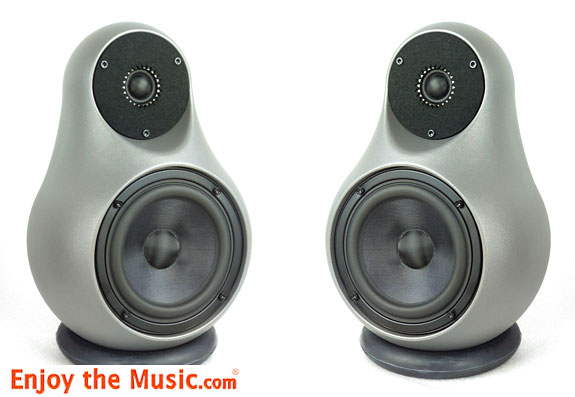
The Matryoshka Dolls
Almost all the women in and around my family had the initial reaction that the JERN 11S look like the little Russian dolls which fit inside each other, and they do, a bit. This is not just for fun. There are perfectly good engineering reasons behind it. The cabinet is designed to eliminate reflections to a large degree, both inside and out.
To eliminate inside reflections and resonances the iron is cast with the inside covered in small cones, not unlike what you see on some diffusors and damping foam. This defocusing of any internal reflections and adding a judicious amount of sheep’s wool leads to extremely low levels of internal resonances and standing waves.
There is a good reason for the outside shape as well. As far back as 1950, Dr. Harry F. Olson showed that sharp discontinuities like sharp edges and especially if they are of equal distance to the speaker driver will lead to sharp and very audible resonances. So, the shape of the cabinets and the mounting of the drivers of the JERN 11S go a long way in providing a real answer to these important issues, limiting resonances in- and out-side the cabinet.
With the speakers, you receive a substantial rubber ring that not only provides some damping and protection when you place the speaker but also allows angling it as required. Clever.
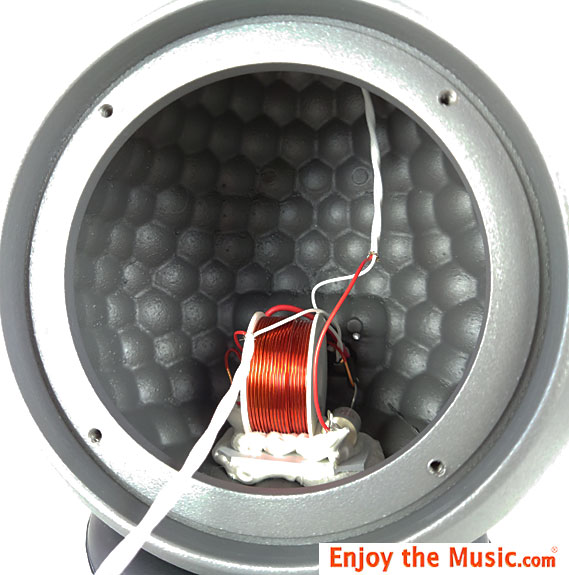
Limitations
They are not large and can’t play real deep bass. This should not come as a surprise since we cannot really change basic physics and a 5.75″ bass-midrange unit cannot move as much air as a 15″. Sometimes though we can create more or less believable illusions like the bass hump of an LS3/5a which helps create the illusion of bass when there is no real bass.
I have used Rogers LS3/5a’s since 1978 with and without the LS35B 12″ woofer that with an electronic crossover made the two into the Rogers Reference Monitor System. While I like the sound of the LS3/5a and have owned a pair for over 40 years, it does not play ‘true’ bass. Full Stop!
The JERN 11S does not have such a hump but it does have a very capable bass/mid driver which can handle a surprising amount of power. While in-room playback is low at 40 Hz and disappears below that, in fact it starts dropping off below 90 Hz, it still provides useful bass. Many listeners of all kinds of music could live quite happily with it playing all sorts of music.
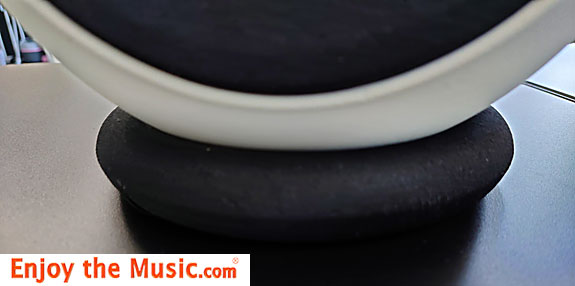
How Do They Sound?
Without having access to serious measuring equipment, my feeling is that the obvious advantages of the cabinet really works. I could not perceive any added colorations. The cabinet is extremely dead, and the shape, having no sharp edges prevents diffraction which usually causes peaks (and dips) with associated rises in distortion and tends to draw the sound to the speaker itself.
Just try thumping your speaker on one of the larger sides. Thumping the JERN will just give you sore knuckles and not much else. They are probably the deadest cabinets I have ever come across and this shows. The JERN 11S sounds exceptionally clean… even up to remarkably high sound levels!
In my not always so humble opinion, there is no such thing as too much of a good amp and I have primarily used two different amps.
A lot of listening was done using my GamuT D200 power-amp which delivers a clean 200 Watts per channel. I have also used the brilliant Lyngdorf TDAI-1120 which is much smaller and a fine partner as well. Together with the JERN speakers, you could even claim a certain Scandinavian Interior Design Style.
Obviously, you can’t expect lots of very deep bass from such a small speaker, but having lived with LS3/a’s I can tell you that you get considerably more real and clean bass than you might expect. No pseudo bass here. The bass starts falling from around 90 Hz, yet still provides useful information down to the low 40 Hz region, and all the while remaining well behaved despite being driven hard by a big amp.
Everything except the very deepest bass is presented in a very balanced way. Is this lack of deep bass a problem? I would say that for many listeners, absolutely not. It will play bass tunefully and it will play loud. One of my favorite rock bands is “The Who” and to get things cooking “Magic Bus” from “The Who Live at Leeds” is right on the money. My room is not too large at 17.8 square meters, which translates approximately into 192 square feet. I also live in a flat in an older building, so I must be considerate of my neighbors.
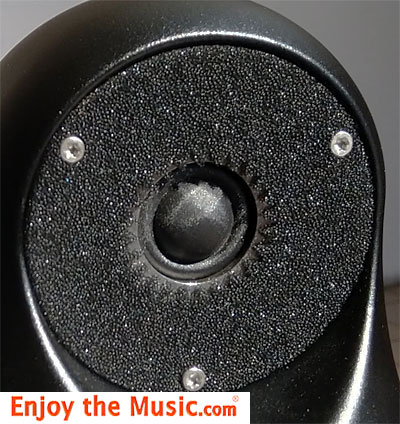
Occasionally (during daytime) I will play a bit louder and playing the above-mentioned “Magic Bus” from “The Who Live at Leeds” I had peak sound levels of 104dB, which is quite loud in my book. Using the GamuT amp, there was no strain and no distortion. So yes, you can rock out with the JERN 11S speakers, but not if you are the owner of a stadium-sized room and not if you are a complete headbanger. I am none of these things, so I got on very well, thank you.
In terms of bass, I already mentioned that the JERN 11 has impressive bass for a small speaker. Ole Lund Christensen recommends that you can put it closer to a back wall than you might normally do, which will support and amplify the bass.
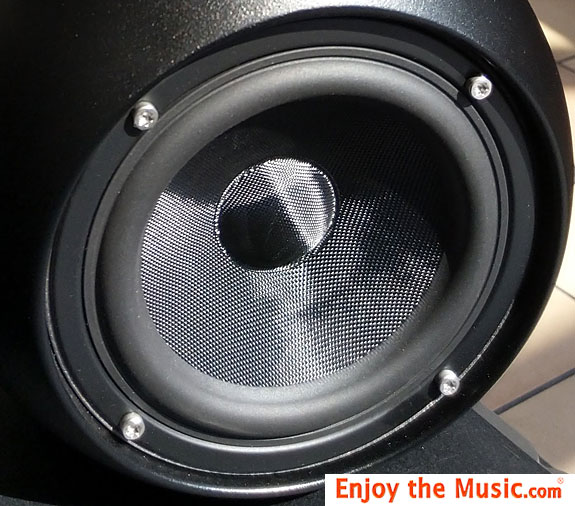
I tried this and several other positions. I must admit that while putting the speakers closer to the wall did indeed strengthen the bass, I also felt that the mid and treble folding around the speaker created too strong reflections from the wall just behind the speaker which hardened the sound to a degree that defeated the intention. One solution would be to damp the space behind the speaker and placing some damping foam between the speaker and the wall did indeed help the sound. I am not sure how aesthetically acceptable it would be to most people. My wife did not appreciate the way it looked although she recognized the improvement in sound.
Having tried this, I did achieve what I would consider superb sound though.
First, it must be said that acoustics trumps everything else. I cannot claim ownership of this observation, but it is true. A fine speaker within an unsuited room or position can sound really, really bad. A reasonable speaker in the best room/position can sound much better. I tried playing on dedicated stands and atop of my old Dali Grand Divas well away from the side and front walls. Playing like this made the speakers disappear, meaning that you had a hard time hearing where they were placed when closing your eyes. The JERN 11S did not draw attention to itself but just produced wonderful sound in space.
Based on a suggestion by Robert E. Greene, although I did not follow it exactly, I was able to avoid early reflections by playing around with redirecting these early reflections back towards the front of the room, using panels on both sides of the room. This simple trick seems to largely eliminate the need for more complex treatment of my room. It can be achieved with a couple of lightweight panels since we are talking midrange and high frequencies.
I have played Classical music of the complex kind with large orchestra like Beethoven’s symphonies with Harnoncourt and Chamber Orchestra of Europe as well as the same with OsmoVänskä, which are just two of the six versions of Beethoven’s Symphonies I have. One piece of music that almost leaves me in ecstasy is Fantasy on a theme by Thomas Tallis by Vaughan Williams in the old version conducted by Barbirolli and a double string orchestra and it was good as expected and wished for.
Also as mentioned above lots of rock. The Who, Bruce Springsteen, Bruce Hornsby which straddles rock and jazz and a bit of drum & bass. For more delicate sounds I played Irish Harp Music with Carol Thompson as well as “Blue” by Joni Mitchell which has just turned 50 (the record that is). Lovely!
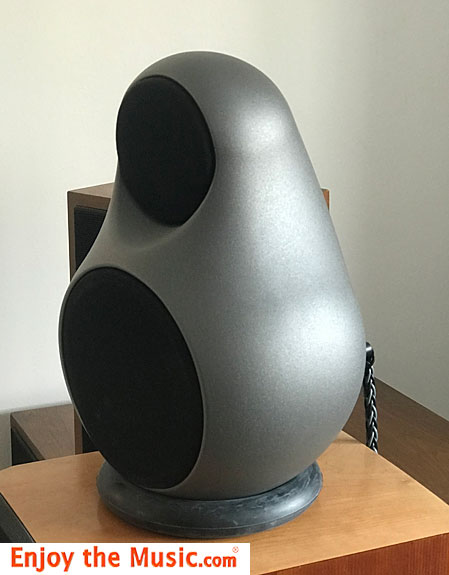
Conclusion
I firmly believe that a good loudspeaker should be able to play any kind of music convincingly and the JERN 11S does. I mentioned above that it cannot dig out the lowest bass, but this is just natural, and in case you think I give the impression that bass is all, that is definitely not what I feel.
This is a very well-balanced speaker across the frequency range. It presents a lovely neutral and pure rendition of all sorts of music. No matter which kind of music you enjoy you will find it well behaved whether it is being hammered with demanding music or playing delicate and refined music. It is a true high-end speaker in a small, and attractive, package. It is not cheap but certainly inexpensive and I have no reservation in recommending it. Just don’t drop it on your toes.
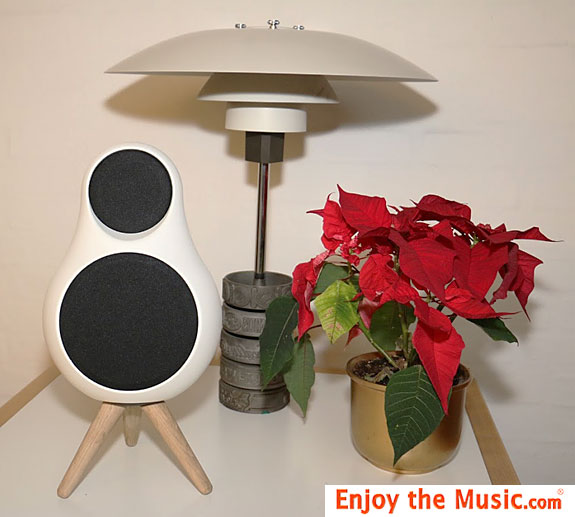
If you add a good subwoofer, it approaches a state-of-the-art speaker system, but many music lovers can live quite happily with it as is, no matter the taste of music you prefer. Please drive it using a decent and well-powered amplifier. Considering that it essentially is the entry speaker in the range I’m looking forward to hearing some of the higher-level models.
One thing remains to be said which is that in keeping with our theme, it will certainly allow you to “Enjoy the Music”.
| Tonality |  |
| Sub–bass (10Hz – 60Hz) | |
| Mid–bass (80Hz – 200Hz) |  |
| Midrange (200Hz – 3,000Hz) |  |
| High Frequencies (3,000Hz On Up) |  |
| Attack |  |
| Decay |  |
| Inner Resolution | |
| Soundscape Width Front |  |
| Soundscape Width Rear |  |
| Soundscape Depth |  |
| Soundscape Extension Into Room |  |
| Imaging |  |
| Fit And Finish |  |
| Self Noise |  |
| Value For The Money |  |

Check out Enjoy the Music!
See many great reviews by Enjoy the Music.com at this link.
Specifications
Type: Two-way compact monitor loudspeaker
Frequency Response: 65Hz to 27kHz
Sensitivity: 86dB/W/m
Amplifier Requirements: 25 to 150 Watts @ 4 Ohms
Impedance: 4 Ohm
Cabinet: Vibrakill
Size: 210 x 300 x 180mm (WxHxD)
Weight 12.44 kgs.
Color: Nordic Black, Polar White, Casting Grey, and Danish Red
Price: $999 each ($1998 per pair)
Company Information
JERN ApS
Birkevej 59
9600 Aars
Denmark
Voice: +45 96 981 775
E-mail: mail@jernspeakers.com
Website: JernSpeakers.com

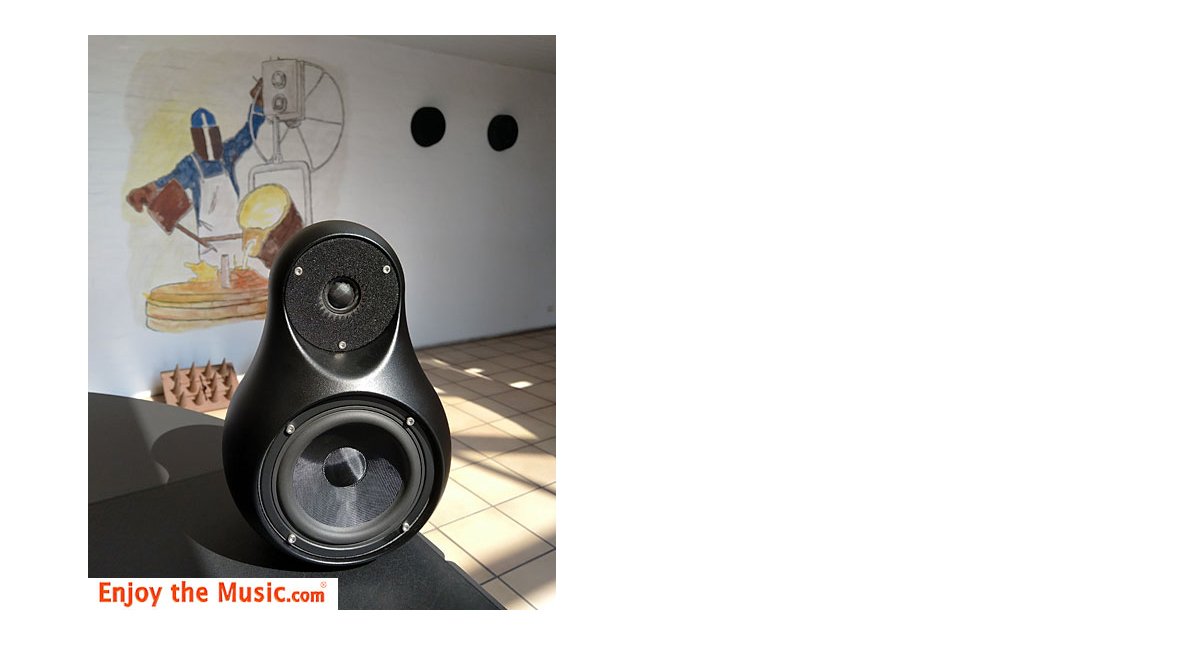






Leave a Reply
Want to join discussion?
Feel free to contribute!